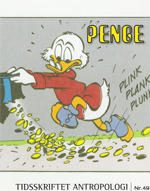PENGEFORMER BLANDT FATTIGE FORBRUGERE I DANMARK
DOI:
https://doi.org/10.7146/ta.v0i49.106655Resumé
The first half of the article presents critical analyses of the existing “consensus” within
consumption studies, namely that consumption is primarily about symbolism, freedom
of choice and lifestyle, by introducing dissenting voices (Carrier & Heyman; Löfgren;
and Lodziak) arguing for a revival of a more political-economic framework. The author
proceeds to argue that by using a broader framework of both qualitative and quantitative
money (Zelizer), it is possible to focus on the interplay between material and immaterial
dimensions at work in contemporary processes of social differentiation. The second
half of the article consists of an empirical analysis of consumption patterns and forms
of money in poor Danish families. This reveals a widespread tendency among the poor
families to earmark the limited amount of money available with the result that they
have no “free money” at all. The earmarking is a way to control money according to
different principles, e.g. use value, temporality, beneficiaries of pursuits (children/
parents), material form (electronic money versus paper money) and moral discourses.
The tendency to conceptualise money in terms of qualitatively different currencies,
however, also places poor citizens in a position outside mainstream consumption
regimes, in contrast to existing discourses on consumption in contemporary Danish
society.
Downloads
Publiceret
Citation/Eksport
Nummer
Sektion
Licens
Ophavsretten til artiklerne i Tidsskriftet Antropologi tilfalder forfatteren.
Artikler publiceret i Tidsskriftet Antropologi må citeres, downloades og videresendes for ikke-kommerciel brug, under forudsætning af normal akademisk reference til forfatter(e) samt tidsskrift, årgang, nummer og sider. Artiklerne må kun genudgives med eksplicit tilladelse fra forfatter(e) og tidsskriftet.


